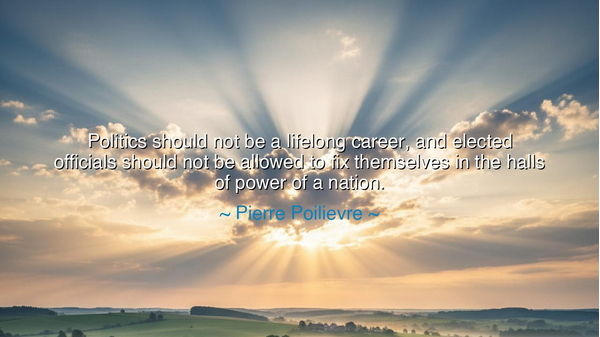
Politics should not be a lifelong career, and elected officials
Politics should not be a lifelong career, and elected officials should not be allowed to fix themselves in the halls of power of a nation.






Hear, O children of vigilance, the stern words of Pierre Poilievre: “Politics should not be a lifelong career, and elected officials should not be allowed to fix themselves in the halls of power of a nation.” In this cry lies a warning as old as governance itself: that the halls of power, once entered, may become a prison to the spirit and a throne to ambition. He declares that politics must be service, not possession, duty, not inheritance.
For when rulers remain too long in their seats, their hearts harden. They begin to see not the people, but their own position; not the needs of the nation, but the preservation of their throne. What begins as noble purpose becomes corruption, and the state itself bends beneath the weight of their permanence. Thus Poilievre calls for renewal—that leaders should come and go like the seasons, refreshing the body of democracy with new strength.
History proves his wisdom. In the last days of the Roman Republic, men like Julius Caesar and others clung to power, refusing to lay it down. Their ambition, unchecked, destroyed the republic itself and gave birth to emperors who ruled for life, often with cruelty. Contrast this with the vision of George Washington, who after two terms relinquished his office. In that act of humility, he preserved the spirit of freedom, proving that leadership must never become ownership.
So too in other lands, where dynasties and rulers sought to fix themselves in power, the people grew restless. Revolutions arose, tearing apart kingdoms that might have endured had their leaders remembered they were servants, not masters. The French kings who ruled for centuries learned too late that permanence without renewal breeds downfall.
Therefore, O seekers of wisdom, let this be your teaching: no one should sit forever upon the seat of authority. For the measure of a true leader is not how long they cling to power, but how willingly they release it for the good of the people. Poilievre’s words endure as a torch of warning—let not the halls of politics become mausoleums of ambition, but temples of service, refreshed with each generation.






VTBinh vy Tieu
Pierre Poilievre’s perspective challenges the idea of lifelong political careers and brings attention to the potential downsides of entrenched power. But would a system of term limits actually work in practice? Could such limits foster more accountability, or might they lead to a revolving door of less effective leadership? How do we ensure that fresh ideas are introduced without losing the institutional knowledge and experience needed for governance?
Ddgbduisnfrdjth
Poilievre’s quote about limiting the career span of politicians is thought-provoking, but it also raises questions about how we define 'career politics.' While it’s true that long-term politicians may become entrenched in power, could there be unintended consequences to enforcing strict limits? For example, might it create an environment where experience and continuity are undervalued, or where voters have less choice in experienced leadership?
TBPhuong Nguyen Thi Bich
I agree with Poilievre’s sentiment that politics should not become a career. The idea of politicians staying in power for too long can lead to complacency and a disconnect from the needs of the public. But the question is, how do we prevent a system that encourages short-term thinking or undermines the value of experienced leaders? Would term limits or rotation in office help, or would it cause instability in government?
KKazaSB
Poilievre’s statement raises an important issue about the concentration of power in politics. If elected officials remain in power for too long, they risk becoming disconnected from the public’s needs. However, how do we balance this with the need for experienced leadership? Could limiting political careers unintentionally reduce the quality of governance or lead to less experienced decision-makers? Is there a middle ground between career politicians and complete turnover?
ATPhan Anh Thu
Pierre Poilievre's view on politics not being a lifelong career resonates with concerns about political stagnation. Shouldn’t there be term limits or a system that encourages fresh perspectives in leadership? The idea of fixed political power may create a disconnect between officials and the people they represent. Could imposing limits on time in office lead to a more dynamic and responsive government, or would it risk losing experienced leadership?